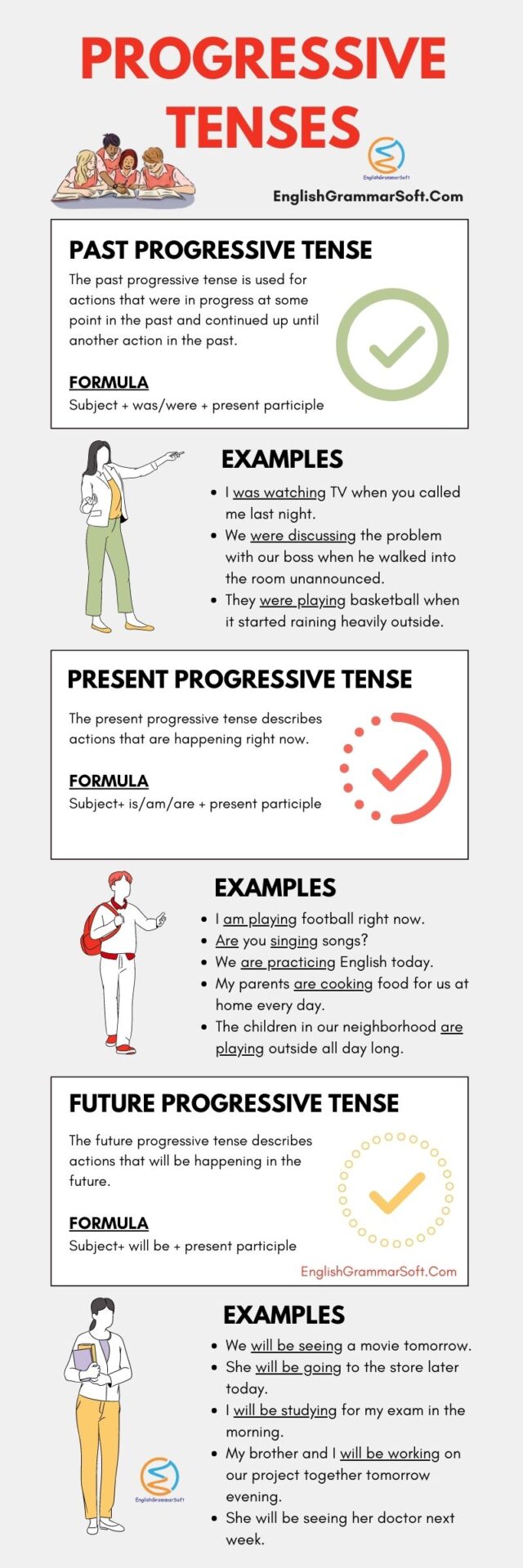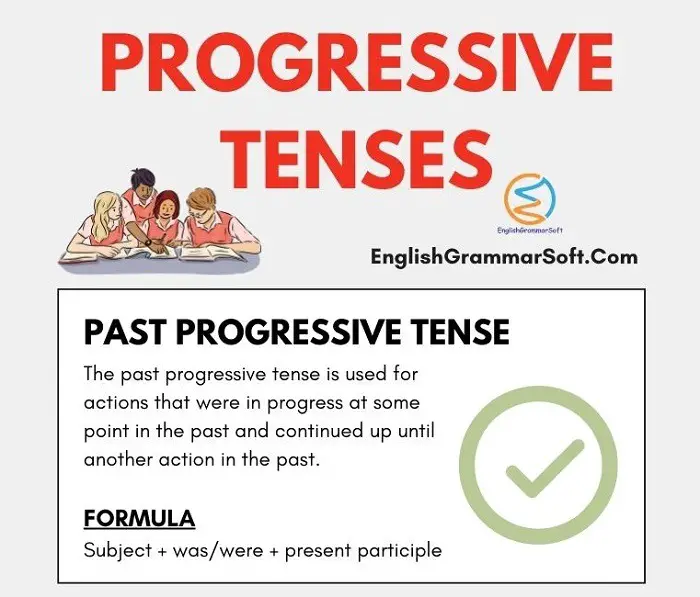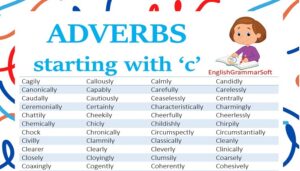Progressive Tenses in English (20 Examples Each)
The progressive tenses are used to describe actions that are in progress or that are incomplete. There are three types of progressive (continuous) tenses; past progressive, present progressive and future progressive.
Progressive tenses can be used in a variety of ways, from telling a story to expressing the idea that something is happening now.
Types of Progressive Tenses
These tenses are formed by using the present participle of the verb.
This table shows the summary of progressive tenses.
| Progressive Tenses | Formula / Structure | Examples |
|---|---|---|
| Past Progressive | Subject + was/were + present participle | She was writing a story. |
| Past Progressive Negative | Subject + was/were + not + present participle | She was not writing a story. |
| Past Progressive Question | Was/were + subject + present participle+? | Was she writing a story? |
| Present Progressive | Subject + is/am/are + present participle | She is writing a story. |
| Present Progressive Negative | Subject + is/am/are not + present participle | She is not writing a story. |
| Present Progressive Question | Is/am/are + subject + present participle + ? | Is she writing a story? |
| Simple Future | Subject + will be+ present participle | She will be writing a story. |
| Future Progressive Negative | Subject + will not be+ present participle | She will not be writing a story. |
| Future Progressive Question | Will + subject + be + present participle+ ? | Will she be writing a story? |
Read also: 12 Tenses in English Grammar
What is Past Progressive?
The past progressive tense is used for actions that were in progress at some point in the past and continued up until another action in the past. It describes actions that were happening in the past but are no longer occurring now. It is formed using the word “was” plus the present participle (-ing). For example: “I was studying English.”
The past progressive uses ‘was/were’ + base form(-ing)
- He was studying English on Monday night when he fell asleep on the couch.
- I was watching TV when the phone rang.
20 Examples of Past Progressive
- I was watching TV when you called me last night.
- We were discussing the problem with our boss when he walked into the room unannounced.
- They were playing basketball when it started raining heavily outside.
- You were sleeping peacefully when my alarm rang at 6:00 am this morning because I had an important meeting at work.
- He was mowing his lawn when I came home from school yesterday because he wanted to prepare for the weekend barbecue party at his house.
- She was talking to her friend on the phone.
- He was playing cricket when he injured his leg.
- I was working when the phone rang.
- I was reading when you called.
- We were listening to the radio when he came home.
- The cat was sleeping on the bed when I came in the room.
- She was wearing her coat when we left for school.
- We were studying English when she came home from work.
- He was taking a shower when his wife came home from work.
- She was cooking dinner when her son came into the kitchen looking for something to eat.
- The children were playing outside when their mother arrived home from work.
- While I was waiting for the bus, I thought about what to do with my life.
- While we were driving to our destination, our car broke down on the highway and we had to call for help.
- They were playing football when I arrived.
- I was playing tennis with my brother when he fell and hurt himself.
What is Present Progressive?
The present progressive tense describes actions that are happening right now. It is formed using the word “to be” plus the present participle (-ing). For example: “She is studying English.”
The present progressive tense is formed by using ‘is/am/are + base form(-ing)
- I am studying English.
- She is watching TV right now.
20 Examples of Present Progressive
- I am playing football right now.
- Are you singing songs?
- We are practicing English today.
- My parents are cooking food for us at home every day, so we don’t have to eat outside every day!
- The children in our neighborhood are playing outside all day long!
- The police officer is waiting for someone who has committed a crime, but he hasn’t caught him yet!
- Are you looking for your keys under the couch?
- They are singing Karaoke at the bar down the street.
- My boss is talking on the phone right now, but I can still hear him shouting at someone in the next room!
- My sister is watching TV while eating chips and drinking soda at the same time!
- My little brother is playing with his toys while his mom is doing chores around the house.
- The neighbors are arguing loudly again because they have been fighting about politics all day long!
- She is sleeping on the sofa.
- We are having dinner together tonight.
- She is playing tennis with her friends.
- I am talking on the phone with my sister because she is sick today.
- The dog is barking in the backyard because he wants to go outside for a walk or play with his favorite ball.
- The baby is sleeping in its crib because it’s very tired after playing all day long.
- She is drawing a picture on the table with crayons and markers.
- I am learning how to cook spaghetti.
What is Future Progressive?
The future progressive tense describes actions that will be happening in the future. It is formed using “will” plus the present participle (-ing). For example: “They will be working tomorrow.”
The future progressive uses ‘will be’ + base form(-ing)
- He will be studying English on Monday night.
- She will be watching TV this evening.
20 Examples of Future Progressive
- We will be seeing a movie tomorrow.
- She will be going to the store later today.
- I will be studying for my exam in the morning.
- My brother and I will be working on our project together tomorrow evening.
- She will be seeing her doctor next week.
- He will be having dinner with us tonight.
- I will be working on my project all weekend.
- I will be laughing at my child’s jokes.
- You will not be watching TV tonight.
- I will be reading a book every day.
- We will be going on vacation in December.
- The baby will be learning to walk within the next year or so.
- The students will be taking the exam on Monday at 9:00am sharp.
- We will be finishing our homework by 6 o’clock tonight.
- They will be working on their project this afternoon, so you should call them later on if you have any questions about it.
- Mary will be playing tennis tomorrow afternoon.
- I will be working at the office until 5 pm.
- They will be taking a trip to Europe this summer, but they haven’t decided where exactly yet.
- We‘ll be staying home all day tomorrow.
- She will be speaking at a conference next month.

Further Reading






